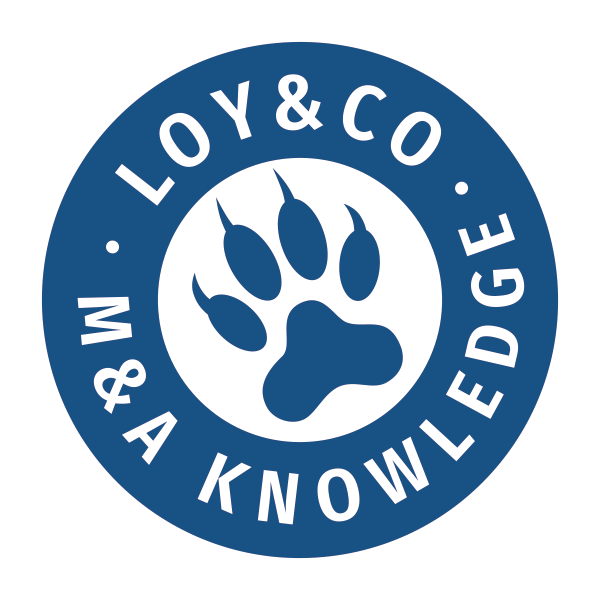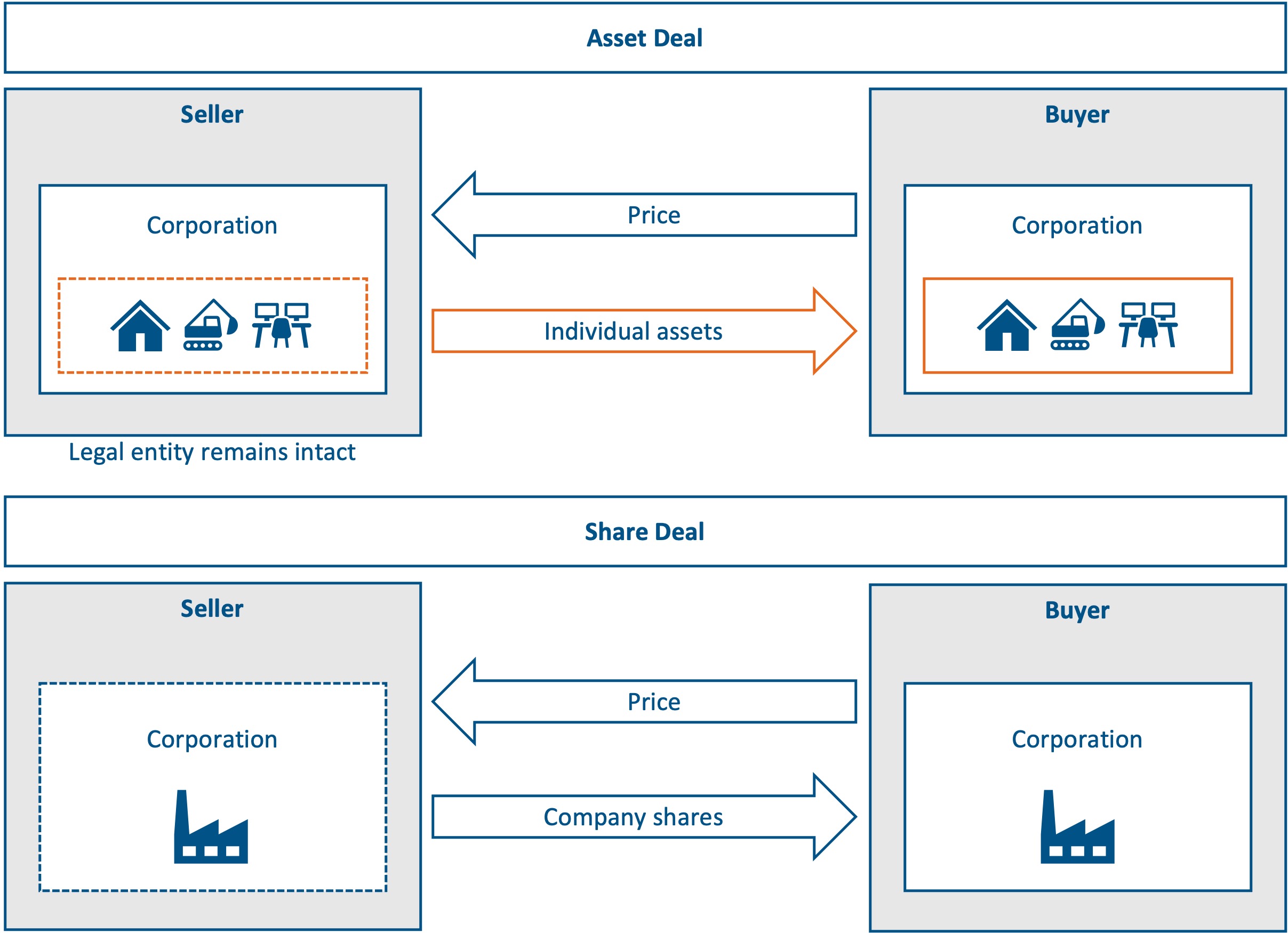

Asset Deal or Share Deal – An Overview of All Advantages and Disadvantages
What advantages can buyers and sellers actually achieve in the purchase of a company with an “asset deal” compared to a “share deal”?
What is at stake
In company acquisitions/sales there are two basic transaction structures. These are discussed between the parties sooner or later in the course of the transaction:
- Transfer of shares in a corporate entity (“share deal”) or
- Transfer of individual assets (“asset deal”).
The decision for one or the other variant is often made under tax considerations. But other aspects can also be critical. From our point of view, the essential question is: can the parties generate additional value through the choice of a specific transaction structure, which is also reflected in the purchase price, or exclude risks that would be an obstacle to the transaction?
- But first: what is the difference between the two variants?
- And then: what are the advantages and disadvantages from the buyer’s and the seller’s point of view?
Difference between asset deal and share deal

In a share deal, as the name suggests, shares are acquired, i.e. the company is acquired as a whole – with all its assets, rights, liabilities and obligations. This is also referred to as universal succession.
In the case of a share deal, the transaction has no influence on the valuation of the assets of the acquired company, but their previous book values are updated.
In an asset deal, on the other hand, individual defined assets are acquired. The corporate rights remain the property of the seller. In an asset deal, the buyer can therefore select individual assets or, conversely, deliberately not acquire individual assets.
In an asset deal, the total purchase price of the acquired assets (including the assumed liabilities) is added to the individual acquired assets in the buyer’s balance sheet up to the amount of their respective market value. In this way, these assets generate a higher tax depreciation potential for the buyer in the future and, with corresponding tax income, a corresponding tax saving. If the total purchase price (including the liabilities assumed) exceeds the fair market value of all assets acquired, the excess amount is also capitalised in the acquirer’s balance sheet as so-called goodwill and is subject to a tax depreciation period of usually 15 years.
Advantages and disadvantages of the two transaction variants
Asset deal more costly
In an asset deal, unlike in a share deal, the assets to be taken over must be listed individually and completely. This listing can be very time-consuming when drafting the contract, as extensive appendices with all the assets to be taken over have to be drawn up. In practice, it is easy to “forget” something.
It is also of great importance that in an asset deal all contracting parties must sooner or later consent to the transfer of their contractual relationships to another legal entity. This consent is usually given. Transitional solutions are possible. However, the procedure can be cumbersome and time-consuming.
In the case of public law permits, certain licences and the like, a transfer to another legal entity is not possible or is disproportionately expensive. In such cases, an asset deal is usually not an option.
In a share deal, the existing contracts remain unaffected. But here, too, there may be “change of control” clauses in some contracts (usually especially in the really important ones!). These are clauses that give the contracting party the right to terminate in the event of a change of shareholders. For example, almost all loan agreements contain such clauses.
From our experience, therefore, the contractual structure in a share deal is often simpler only at first glance. This is because the complete takeover of the entire company, including all rights and obligations, means that extensive provisions have to be negotiated elsewhere. Guarantees, warranties and indemnities play a central role in the contract negotiations for share deals.
Asset deal more customisable and sometimes unavoidable
For the buyer and the seller, an asset deal has the advantage that the scope of the transaction can be better controlled by acquiring only precisely defined assets. In this way, the buyer can exclude unwanted obligations and assets from the acquisition. The reasons for this can be manifold:
In the case of business units with a long and chequered history, for example, a buyer wants to cut off past risks in this way. In the case of the spin-off and sale of partial activities from a company that are not separated under company law (“carve-out”), the asset deal is often unavoidable.
Conversely, as already described, contracts whose takeover is explicitly desired (e.g. customer contracts, distribution contracts, etc.) can and must be transferred separately. If, for example, liabilities or continuing obligations are transferred to the acquirer, the explicit consent of the respective creditor is required. In a share deal, on the other hand, the contractual relationships are automatically transferred by virtue of universal succession (with the exception of the already mentioned contracts with a “change of control” clause).
However, even in the case of an asset deal, the scope for structuring is sometimes limited. This applies above all to existing employment relationships. Even in the case of an asset deal, the employment relationships are “automatically” transferred to the acquirer. As a rule, the transaction will be a transfer of business pursuant to §613a BGB. Whether or not there is a transfer of business should always be assessed individually by an employment lawyer in each case.
In addition to the employment relationships, there are other obligations and liabilities in an asset deal that can be transferred to the acquirer by operation of law without this being explicitly regulated in the purchase agreement (e.g. tax liabilities or liability for the continuation of the company).
Company shell remains with the seller in an asset deal
For the seller, an asset deal means that he retains the corporate shell (e.g. GmbH, KG, GmbH & Co KG) with some assets, liabilities and obligations.
These remaining items are then the responsibility of the seller after the transaction. Very practical questions may then arise: who can and wants to take care of the liquidation? Is there still access to rooms, IT, files, relevant employees? What is to be done about possible tax risks that may be picked up by tax audits that take place after the transaction?
Tax aspects[1]
If the sold company is a corporation and the seller is also a corporation (e.g. GmbH, AG), only 5% of the capital gain is taxed in the share deal, which corresponds to a tax rate of around 1.5% (30% of 5%). This applies in any case to a minimum shareholding of 10%. If the capital gain is distributed to a natural person, the distribution is still subject to capital gains tax of 25% (plus solidarity surcharge and church tax, if applicable). In total, this results in a tax burden of around 27.5%.
If the seller of the shares of a corporation is directly a natural person, the so-called “partial income procedure” (60% of the profit with the respective personal income tax rate) is applied in the share deal. In the case of the maximum tax rate, this corresponds to a tax burden of around 28.5%.
In the case of an asset deal, on the other hand, the profit of a corporation from the sale of individual assets is subject to taxation of approximately 30% (trade tax and corporation tax).
If the net profit is distributed directly or indirectly to a natural person as shareholder, the tax burden increases to approximately 48.5% due to the “final withholding tax” of approximately 27%. This means that the asset deal initially looks significantly less attractive for the seller when viewed in absolute terms.
However, even in the case of an asset deal, taxation remains at only around 30% if the natural person as seller leaves the sales proceeds wholly or partly in the GmbH. In this case, the final withholding tax does not apply to the amount left in the GmbH. If the purchase price is correspondingly high, the transfer to private assets is often not desired, even irrespective of the tax advantages.
One man’s grief is another man’s joy …. because for the buyer the advantage is usually the other way round!
For the buyer, the asset deal is more attractive from a tax point of view in the case of profitable companies, since in this case the acquired assets can be written off in a tax-reducing manner under commercial and tax law.
In the case of a share deal, on the other hand, the acquired company shares are not subject to regular depreciation, so that no tax advantage can be generated from this.
Value enhancement potential through asset deals
Due to the divergence of tax interests between buyer and seller, the seller in the case of an asset deal will want to participate in the tax advantage of the acquirer. In any case, the seller will at least expect to be compensated for his tax disadvantages.
Especially if the sold company generates stable profits and a large part of the purchase price can be allocated to assets with short depreciation periods, the buyer realises considerable tax benefits with an asset deal. This advantage can amount to 20% to 30% of the purchase price for the buyer.
It becomes particularly interesting if this advantage does not correspond to an equal disadvantage for the seller. If this is the case, a real net added value can be created for both sides with appropriate structuring.
Real estate is different
In transactions that are strongly influenced by real estate values, the real estate transfer tax can reach such a relevant magnitude that special transaction structures have to be developed here. Also, the required consent of landlords to the transfer of tenancies can (for example in stationary retail) make asset deals extremely difficult or even impossible.
Exact calculation of the advantageousness not always easy
We usually see the parties first negotiating a purchase price (cash and debt free) as a share deal before the asset deal comes into play. Then transparency has to be created about the after-tax financial effects in both transaction variants. Often not an easy exercise.
In an asset deal, not all contracts and liability risks are typically assumed by the buyer. Therefore, the seller should (or have) the opportunities and risks arising from the transaction assessed as carefully as possible. The result is then essential both for the decision regarding the transaction structure – asset or share deal – and for the purchase price assessment.
Conclusion
Under certain conditions, an asset deal can create additional value for both buyer and seller. Among other things, tax advantages, risk considerations or the necessity of a legal spin-off of previously dependent sub-activities can speak in favour of an asset deal. However, the practical implementation of an asset deal can be complex because all contracts have to be transferred.
To make the right decision, a careful calculation and weighing of the advantages and disadvantages as early as possible in the transaction process is beneficial.
[1] Many thanks to our colleagues at dhmp https://www.dhmp.de/ for their input on the Tax section.

Your contact person
Markus Loy
Managing Director
T: +49 211 20 49 6000M: +49 151 40010026E: loy@loy-cf.deLoy&Co Corporate Finance GmbH
Bilker Straße 11
40213 Düsseldorf